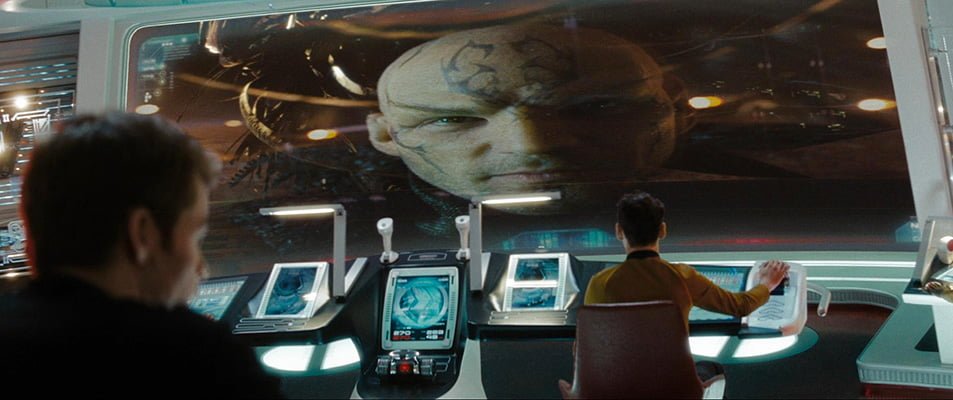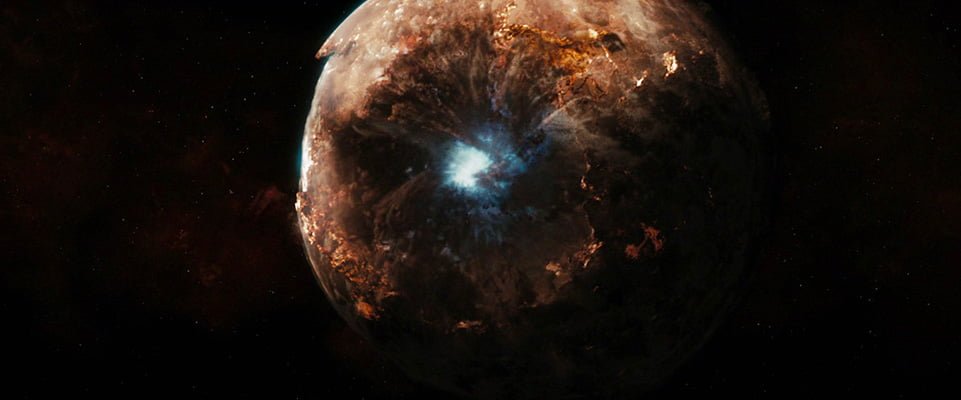Now that that’s out of the way, there’s something I should mention before we get to the review proper. Because we’re covering, well, this, I’m doing things a little differently this week. Instead of just giving you my thoughts and being done with it, I’m going to sum up what I thought when I walked out of the theater ten years ago (and what’s sort of crystalized in my head since) and then I’ll go over my feelings after re-watching the film for the first time in a decade.
Before we get into this, I want to be clear on one point. Despite my misgivings (of which there were many) going into the film, I still wanted to like this movie. After all, whatever else it may have been, it was still (at least in theory) ‘Star Trek’. The first new ‘Trek’ in years, for that matter. So yes, I wanted to like it.
I just… couldn’t.
In fact, I hated this thing. Were I writing this in December, this segment could easily serve as my Festivus Airing of Grievances. “I got a lot of problems with this movie! And now you’re gonna here about ‘em!”

I can (and have) gone on at considerable length about my problems with ‘Trek 09’. Just ask my Facebook friends. In fact, I’ve already scrapped several drafts of this section, either because they got too long-winded and unfocused or because the tone turned into something more hostile than I was comfortable publishing. So when I say that there’s a lot to deal with here, that I could write (and likely have written) volumes on this subject, I want you to understand my full meaning. But as much as I pride myself on thoroughness, this is already a shoe-in to set a record for the longest ‘Final Frontier Friday’ to date, so I’ll do my best to drill down to the core issues.
And the core of a lot of my issues with ‘Star Trek 2009’ would have to be J.J. Abrams. I’ve long tended to describe J.J. Abrams the director as “a poor man’s Michael Bay,” and while I’ve softened on that position somewhat (especially since the release of ‘The Force Awakens‘) I still think the central comparison holds. Because the thing is, Abrams is a spectacle-oriented filmmaker who never quite seemed to find an authorial voice of his own, at least in his feature work. In fact, my sense of him has long been that he’s at his best when he’s imitating the styles of directors he clearly admires (usually George Lucas or Steven Spielberg). But more important than any of that, is the fact that he has quite simply never struck me as someone who “gets” ‘Star Trek’.
And while you don’t have to be a hardcore Trekkie to make a decent ‘Star Trek’ movie (just look at what Nick Meyer did with ‘Wrath of Khan’), it helps if you at least have some grasp of what it is that makes ‘Trek’ tick (something that Stuart Baird clearly lacked when he took the helm of ‘Star Trek: Nemesis’). Even now I’m not convinced he’s ever had much of a sense of what makes for good ‘Star Trek’ stories. Or if he does, it’s never come across on screen. In fact, he set off alarm bells when, in the runup to the film’s release, he mentioned that he’d never really been a ‘Star Trek’ fan (or at least, that he’d not really appreciated the property until he worked on it), having always preferred ‘Star Wars’.
I don’t mention that to play into some ridiculous fandom rivalry. I love both ‘Star Wars’ and ‘Star Trek’, but they’re very different properties that scratch very different itches. What works for one, in other words, isn’t necessarily going to work for the other. And while ‘The Force Awakens’ makes plain that Abrams knows what works for ‘Star Wars’, his ‘Star Trek’ films often see him applying a ‘Star Wars’ approach to ‘Trek’. It’s like trying to jam a square peg into a round hole – you might get it in, but it’s not going to work the way it should.
As a result of that, there’s an extent to which Abrams is forced to rely on the scripts to capture that ‘Trek’-ness. And, well, they tried. What they gave us, though, is frankly a big, dumb action movie script, but it’s the kind of big, dumb action movie script that thinks it’s more clever than it is. It’s not that ‘Star Trek’ can’t be fun and action-packed, but rather that it should have something to say while it’s doing that. And this movie says… what, exactly? Between that and the fact that the script gets whatever sense of ‘Trek’-ness it has by shoveling in every original series cliché it can get its hands on? Well, you’ve got two of the movie’s cardinal sins right there. What you end up with as a result is not a movie that represents ‘Star Trek’ at its best, but rather something resembling “‘Star Trek’ by numbers.”
Think about it. Spock loses control? Check. Kirk hooks up with a green girl? Check. A red shirted crewman dies? Big, cliched check. Film at eleven. To be fair, these tropes do have their roots in the original series, but their prominence has been so exaggerated in the popular imagination as to be representative of a show that never really existed. But even if that wasn’t the case, it still feels like they’re running down a checklist of Things That Have To Be In The Movie. It gives the proceedings a feeling of unintentional parody at best and disrespect for the source material at worst. The end result is something that in my more generous moments I’ve described as a passable sci-fi action movie but a terrible ‘Star Trek’ film.

But the thing about a braindead script is that it can be forgiven if the movie makes up for it elsewhere, say with its characters. I wish I could say they’d pulled that off because this was perhaps the single biggest hurdle the film faced: recasting these iconic roles. The way I’ve tended to describe the reboot cast is “a bunch of actors that I really like… just not in these roles.”
A particularly unfortunate example is Zachary Quinto. I will preface this by saying that there is only one Leonard Nimoy, and I do not envy any actor tasked with stepping into those shoes. But I’ve just never been sold on Quinto as Spock. The best way I can explain it is to say that Nimoy used to say that he played Spock as a deeply passionate man who was constantly fighting to keep that passion in check. By contrast, Quinto just seems angry. Instead of the “deeply passionate man” that Nimoy spoke of, Quinto gives us a man who looks like he’s constantly on the verge of punching someone in the face. This is an acting choice on Quinto’s part, but more often, the cast is being let down by the script.
For that, I would single out Chris Pine’s Kirk. Because Pine is not playing Kirk. This version of the character lacks much of the shading that Shatner’s was given, even (hell, especially) in the earliest episodes. In lieu of this, Pine is left to act through a bunch of clichés that are more reflective of the Kirk you might see on ‘Saturday Night Live’ than the character we know from the original series. Just take a parody skit and add some daddy issues. This one is especially frustrating because I could see Pine pulling off a passable Kirk. In fact, I walked out of ‘Wonder Woman’ feeling like he acted more Kirk-like there (“The word is no. I am therefore going anyway.”) than he does when he’s actually playing Kirk.
And then there’s Scotty. I’ve set this one apart because he really does stand alone. In fact, Scotty might well be the single most egregious example of this film taking an iconic character and turning him into an utter bastardization. Before I go any farther, I want to say that I adore Simon Pegg. But what were they thinking with this characterization? Yes, James Doohan’s Scotty could be funny, but he was a character you could take seriously. He was also more than a little badass whenever the situation called for him to be left in command of the ship. The same cannot be said of Pegg’s Scotty. Here, he’s a clown, played almost entirely for laughs. He’s even saddled these movies with Keenser, who serves no purpose other than to be the second half of a double act that nobody asked for. Seriously, why does Scotty need a comic relief sidekick? Especially when this version of the character is already a buffoonish comedic figure.
I will also admit that some of my problems with ‘Star Trek 2009’ were always compounded by a certain element of “insult added to injury” I’d had, after all, a similarly low opinion of ‘These Are The Voyages…’, which wrapped up not only ‘Enterprise’ but the entire ‘Next Generation’ era with a ham-fisted whimper instead of the bang it deserved. And it wasn’t just that a movie that pissed me off came on the heels (or as “on the heels” as you can be after a four year hiatus) of an episode I loathed, though. It was also – as I realized during a recent rewatch of the ‘Next Generation’ films – the second time in as many movies that we were promised Romulans and given something… else.
Now, if you’re a regular reader of this column, you know I love the Romulans. So the idea of them finally serving as antagonists in a ‘Star Trek’ film was music to my ears. Both times. But what did we actually get? Well, ‘Star Trek: Nemesis’ was certainly Romulan-adjacent, but really it was more interested in Shinzon and the Remans than the Romulans per se. And ‘Star Trek 2009’? Well, they called them Romulans, but pointed ears notwithstanding, there really wasn’t anything terribly Romulan about Nero and his motley band. At the end of the day, they were generic thugs with an off-brand Death Star. It’s disappointing, to say the least.
